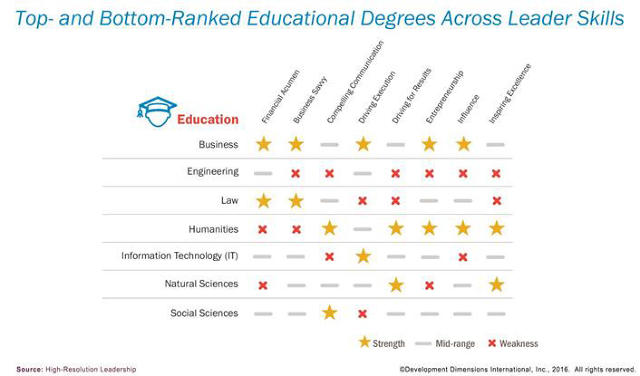Which Degree Will Make You A Better Leader?
Just in time for graduation, reports are examining the economic prospects for the newly minted class of 2016. But one thing is less obvious to both the graduates and their prospective employers: who will make the best leader?
A study from DDI, a global leadership consultancy, made a surprising discovery: Humanities graduates did better than MBAs in a number of areas essential to performing as a leader. As an earlier analysis of DDI’s data revealed, good leadership is rooted in successful conversations. Beyond interpersonal skills, those with humanities degrees had stronger entrepreneurial skills and were more results-oriented.

The U.S. Department of Education data indicates that the MBA is the most popular graduate degree, with over 188,000 students earning one during the academic year 2012-2013, the most recently measured year. During that same time, liberal arts and humanities was the most popular undergraduate degree, with 344,000 students earning one.
The cost of tuition for either can cost as much as six figures, even at public universities. But employers are increasingly demanding graduate degrees for positions that used to only require a bachelor’s. And while DDI’s study found that companies are compensating those who complete their MBA at a top college about 36% more than a candidate with a bachelor’s degree, they also found that a degree from an ivy league school doesn’t guarantee graduates with leadership skills.
DDI’s research was based on studying 15,000 leaders across 300 companies in 18 countries. First they compared the performance of undergraduate business degrees and MBA degree holders against eight skills:
- financial acumen
- business savvy
- compelling communication
- driving execution
- driving for results
- entrepreneurship
- influence
- inspiring excellence
Unsurprisingly, the MBA grads had better scores in financial acumen, but they also has strong business savvy and strategic decision making. Areas where they fell short were coaching, results orientation, and visionary leadership skills.
The latter, according to Evan Sinar, DDI’s chief scientist and lead author of the study, is particularly challenging. He tells Fast Company, “Long-term leaders still struggle with visionary leadership skills,” because it’s a slow-growth skill and “one where leaders need sustained practice in a real-world environment.”
Those who step off the career track to earn an MBA have to suspend their real-world focus on learning how to be visionary in their daily work. For students, Sinar says, the classroom can only provide conceptual learning.
Sinar says, “A focus on building this skill has to be sustained over the course of a career.”
At the undergraduate level, humanities degree holders got high marks for five of the eight leadership skills as did those with business degrees, but for slightly different competencies. Those who earned a bachelor’s in business had the financial acumen and business savvy their humanities counterparts lacked. But they scored only in the mid-range for compelling communication, driving results, and inspiring excellence. Despite this deficiency, a recent survey from CareerBuilder found that employers were currently favoring business graduates above all other majors.
Engineers wound up at the bottom of the pile, with weak scores across six skill sets and middling results for financial acumen and driving for results.
As degrees play into hiring managers decisions to take or leave a candidate as well as the employee’s opportunities for promotions as much as a decade into their career, these findings suggest that degrees aren’t always a good predictor of leadership success.
But it does align with universities’ recent efforts to make the study of humanities relevant. In an increasingly challenging economic landscape for graduates, schools such as Stanford wrap philosophy into one of its most popular interdisciplinary majors, Symbolic Systems. Even without an interdisciplinary course of study, several tech founders, including Jon Dahl of Zencoder, have extolled the virtues of majoring in classical philosophy for aspiring programmers.
Sinar observes, “A job candidate with the skills that his/her degree counterparts lack will have to recognize that assumptions may be made about his/her lack of leadership skills.” He adds, “For them, it will be particularly important to find ways to demonstrate these capabilities to overcome hiring biases—and to differentiate yourself from others holding the same degree, to gain an advantage in the job hunt.”
Fast Company , Read Full Story
(29)














